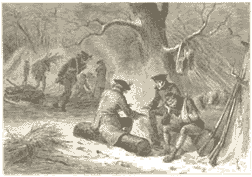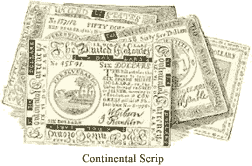It was common practice in the eighteenth century for armies to suspend hostilities during the winter months. In the winter of 1777, Washington chose a site at Valley Forge because it would be easily defended from surprise attack. He also trusted that provisions for the soldiers would be readily available from local farmers.
 From the beginning, however, lack of food and clothing were serious problems for the 12,000 encamped men. They had little to eat other than fried dough, referred to as "fire cakes." The soldiers were in tatters. Accommodations were hastily constructed: bunkhouses with canvas walls, dirt floors and fireplaces. This housing was smoky and cold—an ideal place for the spread of infectious disease. The soldiers were subject to bouts of cold that thawed into mud, then refroze. Local farmers were reluctant to exchange food for the nearly worthless Continental scrip and some preferred to deal in hard money with the British 25 miles away in Philadelphia. During the course of the winter, the American force dwindled to about one-half its initial size, due primarily to desertion.
From the beginning, however, lack of food and clothing were serious problems for the 12,000 encamped men. They had little to eat other than fried dough, referred to as "fire cakes." The soldiers were in tatters. Accommodations were hastily constructed: bunkhouses with canvas walls, dirt floors and fireplaces. This housing was smoky and cold—an ideal place for the spread of infectious disease. The soldiers were subject to bouts of cold that thawed into mud, then refroze. Local farmers were reluctant to exchange food for the nearly worthless Continental scrip and some preferred to deal in hard money with the British 25 miles away in Philadelphia. During the course of the winter, the American force dwindled to about one-half its initial size, due primarily to desertion.
 One of the few bright spots at Valley Forge was the presence of Baron Friedrich Wilhelm von Steuben, a Prussian general who had met Benjamin Franklin in France and received from him a letter of introduction to Washington. Von Steuben assumed the task of training the Continental forces and managed to instill a sense of discipline and positive morale. Von Steuben later served at Yorktown, and after the war he was awarded a pension by Congress.
One of the few bright spots at Valley Forge was the presence of Baron Friedrich Wilhelm von Steuben, a Prussian general who had met Benjamin Franklin in France and received from him a letter of introduction to Washington. Von Steuben assumed the task of training the Continental forces and managed to instill a sense of discipline and positive morale. Von Steuben later served at Yorktown, and after the war he was awarded a pension by Congress.